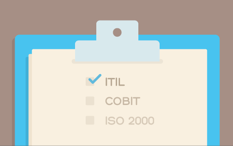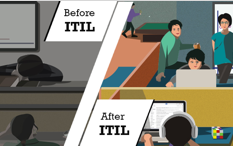ファンデーションレベル
これは認証における第1レベルです。ここでは重要な要素の一般的な認識、ITILコンセプトの基本、ITILサービスライフサイクルで使用される重要な定義、およびサービスマネジメント実践への貢献に重点を置いています。
ITIL認定ファンデーションレベルの対象者
- ITILフレームワークの基本的な理解を希望する方
- ITサービスマネジメントを改善するためのITIL導入方法を理解したい方
ファンデーションレベルは40の選択問題で構成されており、レベルをクリアした候補者に2クレジットが授与されます。少なくとも65%(40問中26問)の正解が認定の取得ラインです。 ファンデーションレベルは持ち込み禁止の試験で、試験を受けるために必要な前提条件はありません。ITサービスマネジメントに関心のある人なら誰でも試験を受けることができます。
プラクティショナーレベル
プラクティショナーレベルは、ITIL認定の2番目のステップです。この段階では、ファンデーションレベルとインターメディエイトレベル(ITIL認定の3番目のレベル)の間の橋渡しを行うことに焦点を当てています。プラクティショナーレベルの主な目的は、ITスタッフが職場でITILフレームワークを採用できるようにすることです。
DevOps・アジャイル・リーンのような他のフレームワークのベストプラクティスを構築することで、ITIL実践者はITサービスマネジメントにおけるあらゆる改善イニシアティブに価値を与えます。ファンデーションレベル同様、プラクティショナーレベルには40の選択問題があり、135分以内に回答する必要があります。このレベルの合格ラインは最低70%(40問中28問)です。最初のレベルとは異なり、これは持ち込み可の試験です。このレベルを完了すると、3クレジットが付与されます。
インターメディエイトレベル
このレベルは柔軟な構造で、2つのカテゴリを含みます
- サービスライフサイクル
これは5つの試験で構成されています。5つの試験では、サービスストラテジ・サービスデザイン・サービストランジション・サービスオペレーション・継続的サービス改善を取り扱います。
- サービスケイパビリティ
保護と最適化の計画・リリース管理と検証・運用サポートと分析・サービス提供と契約の4つの試験を実施します。
上記の詳細からわかるように、ITIL認定のインターメディエイトにおける各モジュールは、サービスマネジメントのさまざまな側面に焦点を当てています。インターミディエイト資格は必要な数だけ取得することが可能です。モジュールから学びたい内容に基づいて、これら両方のカテゴリのモジュールを組み合わせて受験できます。
インターメディエイトレベルでは15または16クレジット(選択したモジュールによる)が与えられます。ただし、インターメディエイトレベルは、ITILのファンデーション試験に合格し、ITIL認定機関の認定トレーニングコースを修了した方にのみ提供されます。
エキスパートレベル
ITILフレームワークに対する理解度を実証したいとお考えの方には、ITILエキスパート認定が最適です。エキスパート認定は、ITILのベストプラクティスに関する十分に詳細な知識とスキルを持っている人物に与えられます。
ITILエキスパート認定を取得する上での重要な要件がいくつかあります
- 候補者は、ITILファンデーションまたはブリッジ資格を取得済みである必要があります
- 候補者は、ファンデーションおよびインターメディエイトコースで最低17単位を取得している必要があります。
- ITILエキスパート認定の資格取得基準である合計22クレジットを取得するには、ライフサイクル全体の管理(MALC)モジュールを取得する必要があります。
マスターレベル
すべてのITILマスター取得候補者は、ITIL関連の職務において、職場での導入プロジェクトの成功を実証する必要があります。Axelos(ITILフレームワークの作成元)によって提案された固定https://www.freshworks.com/freshservice/規定のシラバスやトレーニングはありません。Axelosのウェブサイトには、「実践的なITILの広域かつ【実践的】な経験があり、実践の導入に積極的に関与していることを実証する必要があります」と記載されています。ITIL認定のマスターレベルにおける受験資格は以下の通りです
- ITILエキスパート認定を取得済みである
- ITSMで少なくとも5年間に渡り経営におけるリーダーシップ、管理、顧問の役割を果たしている
ライフサイクル全体の管理
候補者は5クレジットを獲得できます。ITILファンデーション試験に合格し、さらに15クレジット(インターメディエイトコースから)を修得することが、この試験に参加するための最低条件です。つまり、この試験を受けるには、最低17クレジットが必要だということです。世界中の多くのIT担当者が、これをITILエキスパート認定取得の入り口として活用しています。
各レベルの認定を完了すると、認定とクレジットが付与されます













